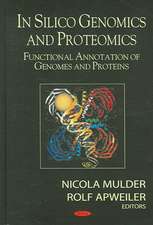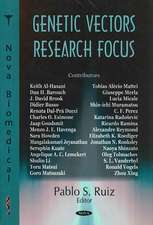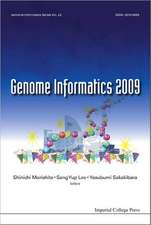Foundations of Comparative Genomics
Autor Arcady R. Mushegianen Limba Engleză Hardback – 24 mai 2007
- Presents an historic overview of genome biology and its achievements
- Includes topics not covered in other books such as minimal and ancestral genomes
- Discusses the evolutionary resilience of protein-coding genes and frequent functional convergence at the molecular level
- Critically reviews horizontal gene transfer and other contentious issues
- Covers comparative virology as a somewhat overlooked foundation of modern genome science
Preț: 615.04 lei
Preț vechi: 798.75 lei
-23% Nou
Puncte Express: 923
Preț estimativ în valută:
117.70€ • 127.81$ • 98.87£
117.70€ • 127.81$ • 98.87£
Carte tipărită la comandă
Livrare economică 22 aprilie-06 mai
Preluare comenzi: 021 569.72.76
Specificații
ISBN-13: 9780120887941
ISBN-10: 0120887940
Pagini: 280
Ilustrații: Illustrated
Dimensiuni: 184 x 260 x 22 mm
Greutate: 0.79 kg
Editura: ELSEVIER SCIENCE
ISBN-10: 0120887940
Pagini: 280
Ilustrații: Illustrated
Dimensiuni: 184 x 260 x 22 mm
Greutate: 0.79 kg
Editura: ELSEVIER SCIENCE
Public țintă
Researchers and students in computational bioloy, evolutionary biology, and geneticsCuprins
Preface
1. The Beginning of Computational Genomics
2. Finding Sequence Similarities
3. Homology: Can We Get It Right?
4. Getting Ready for the Era of Comparative Genomics: The Importance of Viruses
5. The First Fact of Comparative Genomics: Protein Sequences are Remarkably Resilient in Evolution
6. The Second Fact of Comparative Genomics: Functional Convergence at the Molecular Level
7. Prediction of Function and Reconstruction of Metabolism from Genomic Data: Homology-Based Approaches
8. Prediction of Function and Reconstruction of Metabolism: Post-Homology Approaches
9. Structural Genomics:What Does It Tell Us about Life?
10. How Many Protein Families are There?
11. Phylogenetic Inference and the Era of Complete Genomes
12. Two Stories about Evolution
13. Minimal and Ancestral Genomes
14. Comparative Genomics and Systems Biology
References
Index























